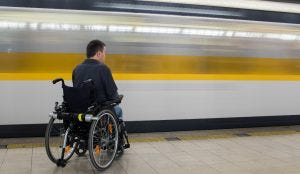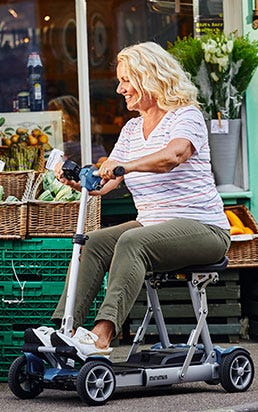Access to public transport is a lifeline for those who have a disability, providing essential and invaluable independence. Unfortunately, it’s not uncommon for those with a disability – particularly wheelchair or mobility scooter users – to be turned away from a means of transport. Quite often, this rejection constitutes unlawful discrimination, but not always. This presents an important question: What are your rights when it comes to public transport and disability?
Mass Use Public Transport
Trains

When it comes to using trains as your means of public those with a disability have every right to travel on any National Rail train company service, this is protected by the Disabled People’s Protection Policy or DPPP. Every train company must set out a DPPP that must be approved by the Office of Rail and Road. Anyone can request a copy of any train companies DPPP to see how they should be assisting disabled passengers. Although those with a disability have every right to travel on the trains themselves it’s important to check that your journey has the necessary access.
The train will have space for a wheelchair or mobility scooter but some stations may not have sufficient facilities, particular smaller stations and those in rural areas. Therefore, checking ahead will help you plan around the facilities available. Additionally, notifying a station of your intention to travel will also help, this can be done ahead of time or by getting a member of staff to phone ahead to other stations. A folding mobility scooter will often make travel easier if this is an option for you. It’s also worth noting that a disabled person’s railcard can give you discounts on your travel.
Buses
Using a bus as your means of public transport if you have a disability comes with some slightly different rights in comparison to trains. One of these is that a bus – or coach – driver must provide reasonable assistance when it comes to boarding and leaving the vehicle.
However, this does not include lifting heavy mobility equipment. Additionally, for coach trips it’s important to notify the company of your requirements as you book so they can prepare accordingly. In terms of your right to travel on a bus you cannot be turned away specifically because of your disability as this would constitute discrimination.
If your mobility aid would obstruct other passengers and compromise safety the driver can turn you away. This is most likely to happen if you have a very large mobility scooter and the bus is of an older design as newer buses have a low floor and more space to improve access. Additionally, a disabled bus pass for free travel is available from your council to be used anywhere in England.
Private Hire Public Transport
Taxis
 For private hire public transport, such as taxi operators, disability access vehicles must be available in larger areas, particularly cities. These may require pre-booking so contact the company or the council taxi licenser for information.
For private hire public transport, such as taxi operators, disability access vehicles must be available in larger areas, particularly cities. These may require pre-booking so contact the company or the council taxi licenser for information.
If you’re travelling in London all black cabs should be wheelchair accessible, so pre-booking is not a necessity and the newer models also have induction loops and intercoms for hearing aid users. Any taxi that is wheelchair accessible must accept a disabled passenger, although mobility scooter users must use an ordinary taxi seat and the scooter needs to be able to be safely transported.
For individuals who have an assistance dog the taxi driver must take them as a passenger in most circumstances. The only exception is when the driver themselves has a medical condition exacerbated by dogs and displays a yellow Notice of Exemption in their windscreen.
It's also the dog owner’s responsibility to ensure the dog behaves during the journey and does not cause damage. If you feel you are unlawfully refused travel and have been discriminated against you should contact your council’s taxi licensing office as a first step of escalation. By staying informed of your disability rights on public transport you can take steps to smooth out your journey and call out unlawful discrimination.


 Price Match Promise
Price Match Promise
 Next day delivery, 7 days a week
Next day delivery, 7 days a week
 Nationwide Showrooms
Nationwide Showrooms
 Rated Excellent
Rated Excellent







